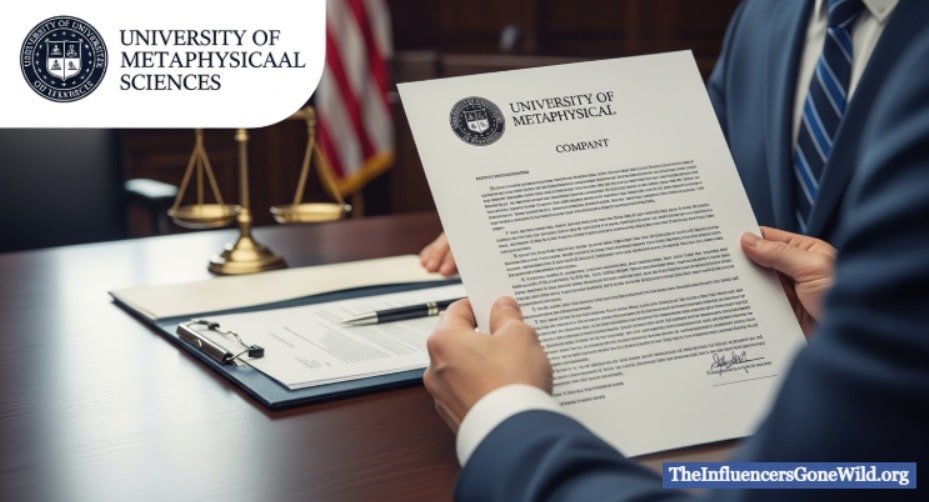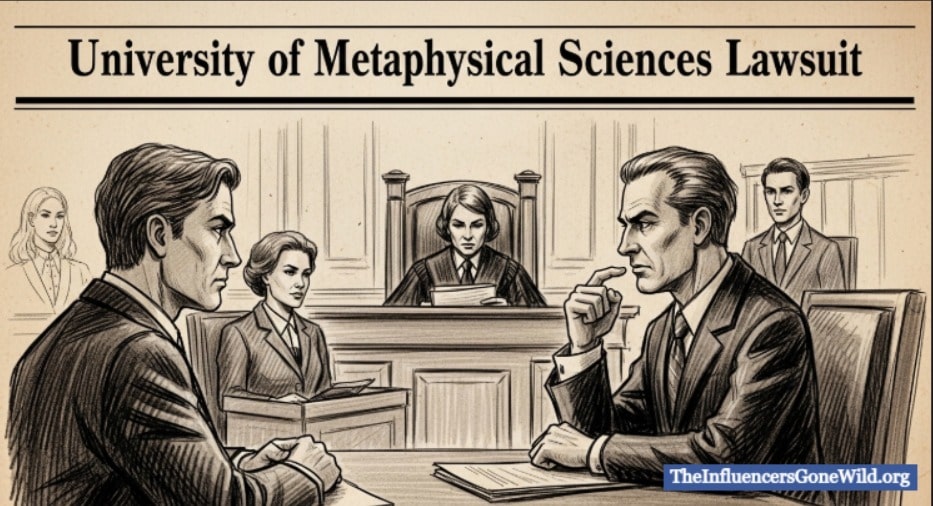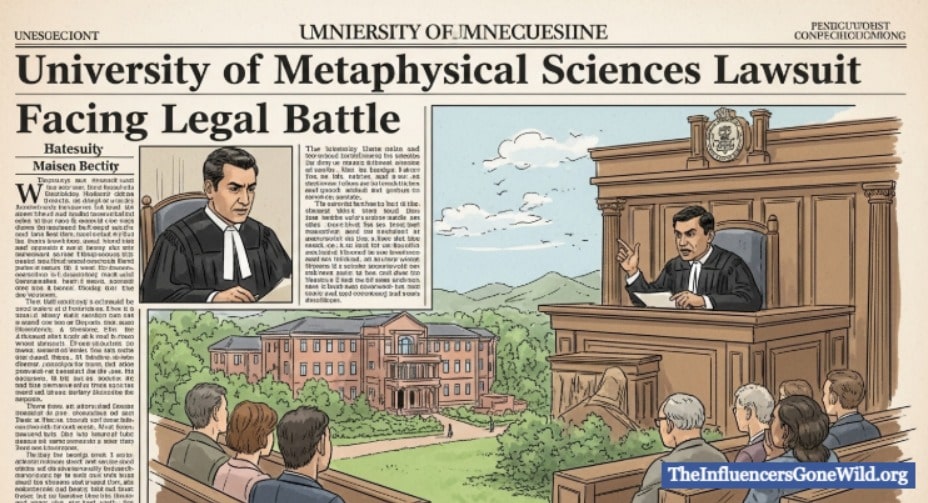Introduction
The world of alternative education and metaphysical studies has long existed at the intersection of spirituality and academia. Among the institutions in this niche space, the University of Metaphysical Sciences (UMS) has gained attention both for its unconventional teachings and recent legal entanglements.
The university has offered courses in metaphysics, spiritual counseling, and holistic practices, but over the past few years, it has found itself entangled in lawsuits and controversy.
This article provides a comprehensive overview of the lawsuit involving the University of Metaphysical Sciences, exploring what triggered the legal action, the nature of the claims, the responses, and the broader implications for metaphysical education providers.
What is UMS?

The University of Metaphysical Sciences, founded by Christine Breese, is an online spiritual education institution. It offers a range of degrees in metaphysical studies, including:
- Bachelor’s in Metaphysical Sciences
- Master’s in Divinity or Spiritual Counseling
- Doctorate in Metaphysical Theology
The university promotes spiritual growth and self-realization through courses in:
- Meditation and mindfulness
- Energy healing and chakra work
- Past life regression
- Esoteric philosophy
UMS operates primarily online and has catered to a global student base seeking non-traditional, spiritually oriented education.
Why is UMS Facing a Lawsuit?
1. Unaccredited Degree Programs
One of the primary complaints is the validity and accreditation of the degrees offered by UMS. The institution is not accredited by agencies recognized by the U.S. Department of Education, which has led to claims of misleading students about the professional value of their degrees.
Key Allegations Include:
- Misrepresentation of degree legitimacy
- Selling “degrees” that lack academic recognition
- Charging fees for courses without clearly disclosing accreditation status
Note: This type of legal issue is common among institutions operating in the metaphysical or religious education space, where spiritual degrees fall outside conventional regulation.
2. Consumer Fraud Claims
Former students and critics allege that UMS engaged in deceptive advertising, promising recognized qualifications and career prospects that didn’t materialize. The lawsuit argues that students were misled into paying tuition under pretenses.
Examples cited in the case:
- Testimonials claiming career success based on UMS degrees
- Implying ministerial or counseling licenses that don’t meet state requirements
3. Operating Without State Approval
In some states, operating as a degree-granting institution requires state licensure or educational authorization. The lawsuit suggests that UMS may have:
- Failed to register or obtain approval in jurisdictions where students resided
- Violated educational statutes by promoting degrees without proper oversight
The Role of Christine Breese
Christine Breese, the founder of UMS, is a central figure in both its operation and the lawsuit. She is a metaphysical teacher, speaker, and author, often promoting UMS through spiritual seminars and online platforms.
Critics argue that Breese:
- Used spiritual influence to validate the institution without legal backing
- Profited significantly from tuition payments despite questions over credibility
- Continued promoting unlicensed degrees, even after warnings
However, supporters of Breese counter that UMS clearly states it offers non-accredited spiritual education and that students enroll with full knowledge of the degree limitations.
Accreditation and Legitimacy
What Does Accreditation Mean?
Accreditation is a voluntary process in the U.S., but it greatly impacts how legitimate and recognized a degree is, especially for employment and further education. UMS is not accredited by any agency recognized by the Council for Higher Education Accreditation (CHEA) or the U.S. Department of Education.
Consequences of Non-Accreditation:
| Aspect | Implication |
| Employment | Degrees may not be accepted by employers |
| Government Funding | Students not eligible for federal aid or scholarships |
| Professional Licensing | Counseling or ministerial roles may be invalid |
Is It Illegal to Operate Without Accreditation?
No, but it becomes legally questionable when:
- Institutions market their degrees as professional or equivalent to accredited ones
- Students are not informed of the implications
- Institutions violate state regulations regarding religious exemptions
UMS Responds to Allegations
UMS and Christine Breese have responded to the lawsuit with the claim that:
- They operate as a religious and spiritual educational entity, not a traditional university
- Students voluntarily enroll in spiritually based programs with an understanding of their nature
- Course materials and qualifications are meant for personal development, not professional licensure
UMS may also invoke First Amendment protections, asserting that spiritual teachings fall under religious freedom, not educational fraud.
Implications for Students and the Industry
1. How Students are Affected
For many students, discovering that their degrees have limited utility can be disheartening. It impacts:
- Career aspirations, especially in counseling or ministerial fields
- Financial investments in tuition and certification
- Reputation among peers or employers
2. Industry-Wide Impact
This lawsuit may serve as a precedent for how governments regulate:
- Religious vs. academic education
- Online metaphysical schools
- Consumer protection in education
Institutions similar to UMS may face stricter scrutiny, and students may demand transparency regarding accreditation and outcomes.
How to Protect Yourself

If you are considering enrolling in a metaphysical or spiritual school:
Checklist Before Enrolling:
- Research Accreditation: Is the institution recognized by legitimate bodies?
- Ask for Disclosures: Are degree limitations clearly communicated?
- Review Testimonials: Are claims of success independently verified?
- Look for Transparency: Is the curriculum accessible and straightforward?
- Check State Laws: Are licenses or registrations required for practice
Conclusion
The lawsuit against the University of Metaphysical Sciences highlights the growing tension between spiritual education and legal regulation.
While institutions like UMS serve a unique purpose in personal and spiritual development, they must also uphold standards of clarity, honesty, and ethical responsibility, especially when offering degrees that resemble traditional academic credentials.
Students deserve transparency, and institutions must balance their spiritual mission with legal accountability. As the case continues to unfold, it may reshape the future of metaphysical education across the United States and beyond.
FAQs
Is the University of Metaphysical Sciences a real university?
UMS is a privately operated spiritual education institution, but it is not accredited by recognized academic bodies. It operates under religious exemption laws in some jurisdictions.
Can I use a UMS degree for counseling jobs?
In most cases, no. UMS degrees are not recognized for state-licensed counseling positions, although some graduates may use them in non-licensed spiritual practices.
Is Christine Breese a licensed doctor or therapist?
Christine Breese holds a doctorate from UMS and other non-accredited spiritual institutions, but she is not a licensed medical or mental health professional in the traditional sense.
Is UMS under legal investigation?
Yes, UMS has been involved in a lawsuit alleging misrepresentation of degree value, consumer fraud, and failure to meet educational regulations.
Are spiritual degrees legal in the U.S.?
Yes, but their use is limited. Offering them is legal under religious freedom, but claiming equivalency to accredited degrees can lead to legal consequences.



